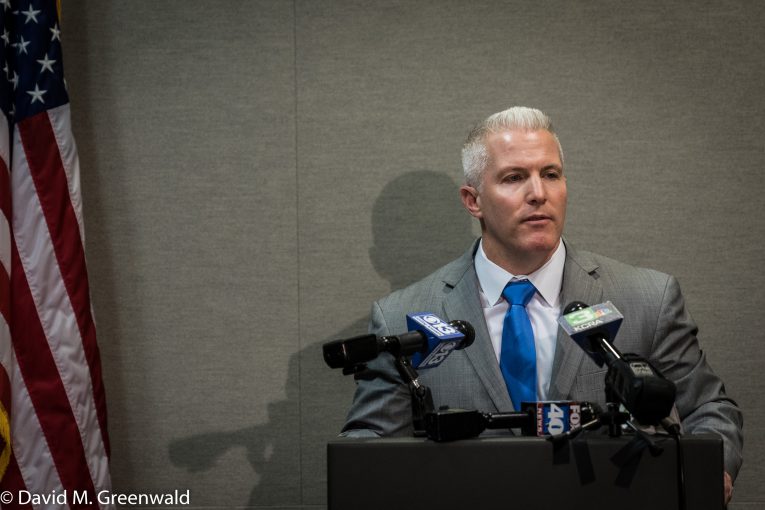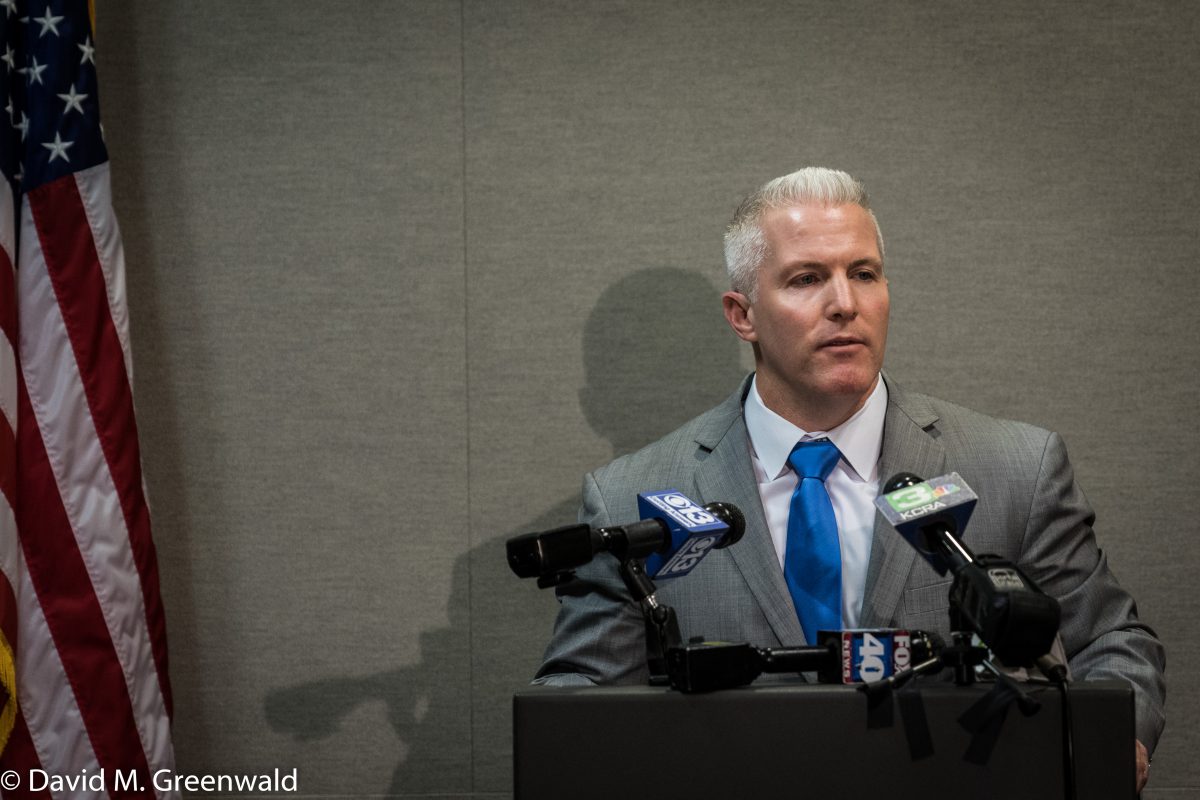

By David M. Greenwald
Yolo County, CA – Here we go again. In 2018, Yolo County DA Jeff Reisig, facing what would become a tight reelection bid, was declared by the local paper to be the most progressive DA in the state despite a long record that argued against that. Now the Bee writes an editorial praising his efforts for launching a transparency portal.
As the Bee editorial board notes, the organization Measures for Justice launched a website called the “Commons” which includes “an interactive platform to track Yolo County’s criminal processes and outcomes.”
“The site does not provide information on individual cases, but anyone with access to the internet can access the site and study, for instance, how often cases for certain drug offenses are filed against defendants of color versus white defendants,” The Bee’s Sam Stanton reported. “The site also offers individuals the ability to flag problem areas and with one click send their concerns to lawmakers, the media or simply post it to social media.”
All of this is fine, perhaps even, dare I say, welcome, although having attempted to use their existing data, I worry just how accurate this will be—that’s a story for another day.
But what really got me here is this: “Racial bias pervades the criminal justice system, but there’s some promising news coming out of Yolo County. District Attorney Jeff Reisig is pioneering reforms to increase transparency and shed light on potential disparities. Every DA in California — including Sacramento’s — should take notes.”
So DAs like Chesa Boudin and George Gascón, who have actually been piloting policy changes, are not the promising news. Nor is the state legislature that has been chipping away at reforming the  system for a decade.
system for a decade.
It’s DA Jeff Reisig who has been running an ongoing campaign against Zero Bail and has opposed just about every single reform measure in California from Prop. 47 to Prop. 57 to most recently SB 1437 (felony murder), and of course bail reform and reforming the death penalty. Heck, Reisig was one of four DAs to oppose Prop. 64 to legalized recreational cannabis.
The Bee notes: “The effects of systemic racism in criminal justice are well-documented. Black people are six times more likely to be incarcerated than white people after an arrest, according to a 2018 Sentencing Project report to the United Nations. Latinos are three times more likely.”
To their credit they acknowledge—at least superficially—some hypocrisy here on the part of Reisig.
They write: “During the Black Lives Matter protests last summer, public defenders in Yolo County spoke out about racial disparities in criminal sentencing and joined protesters in a demonstration outside the courthouse. Reisig denied the claims. But It’s clear that he wants to be more proactive and address these realities head-on.”
That’s actually exceedingly polite about what Reisig did last year when Tracie Olson, Yolo County’s public defender, dared to accurately point out disparities in Yolo County’s jail.
Tracie Olson, in response to a question on disparities, stated, “Honestly we see Black people go to prison for crimes that white people don’t go to prison for…On April 20, I looked at the jail population. We had about a little under 200 people in the jail, 49 of whom were Black. So that’s 25% of our Yolo County jail population is Black. Yolo County’s demographic population is 3% Black. So we have over an 800% over-representation of Black men and women in our local jail. So it is a local problem.”
Jeff Reisig in a press release responded, “Allegations of judicial racism and police corruption can never be ignored. They cannot go uninvestigated. They cannot be allowed to simply fade away into the chaotic media cycle or dishonest blogosphere.”
In response to her descriptive comment, Reisig demanded that “the ethical and legal obligation is on you to appear in public session before your employers, the Yolo County Board of Supervisors, and demonstrate the truth of your televised allegations of racism and corruption against judges and law enforcement from two weeks ago with facts and evidence. On issues as important as these, at a time as critical as now, silence or fact-dodging is not acceptable.”
Jeff Reisig grossly overreacted to Tracie Olson’s comment that was not personally directed at him or his office. At that time, he actually had an opportunity to reach out and call for an analysis to figure out why we saw a great disparity. Instead he went for the attack, complained that the she took the numbers out of context and only later is he attempting to figure out the extent of the problem.
As Tracie Olson points out: “This data confirms what we in the criminal legal system already know, that Black and Brown people are treated differently. The relevant question now becomes, what are we willing to do about it?
So how is it that Reisig on the one hand can attempt to put forward an agenda that he can claim the reform mantle while being in line to head up CDAA (California District Attorneys Association)—and opposing pretty much all of the major criminal justice reform efforts put up by the legislature, passed by the voters, or proposed by the progressive prosecutors like Chesa Boudin and George Gascón?
As Jonathan Raven, Chief Deputy DA for Yolo County, attempted last fall, clearly Reisig is attempting to position himself between people like Sacramento’s Ann Marie Schubert, whom the Bee prods with Reisig’s achievements and more reform-minded DAs like Boudin and Gascón.
Last fall Raven wrote, “Many would consider Yolo County’s DA Jeff Reisig, to be ‘mainstream,’ yet we have numerous innovative and progressive programs. I started thinking about our innovative and progressive programs and wondered ‘are we really “mainstream”?’”
He continues: “What the media and articles don’t report is that many ‘mainstream’ prosecutors are doing ‘progressive’ things. While the media reports on newly elected progressive prosecutors, they miss the many innovations by prosecutors labeled ‘mainstream.’”
He adds, “But back to that ’mainstream’ label; our DA might not agree with San Francisco DA Chesa Boudin on some issues, [but] they are like-minded on many others.”
The problem is that Reisig is getting a lot of credit for doing not very much. And, indeed, his record looks little different from Schubert’s in terms of the reforms he has opposed and his continued attack on things like Zero Bail.
As Jessica Pishko, a journalist, pointed out to me, “The Yolo DA is using data and claims of being rational and using ‘common sense’ as a way to skirt embedded problems in the system overall and avoid large structural change.”
That’s exactly the problem. We already know there are huge disparities in Yolo County and elsewhere. This data portal isn’t going to answer that problem. The only real question is what we are going to do about it—and for Reisig, he has opposed more of the reform efforts aimed at addressing racial inequity.
The Bee concludes: “Reisig’s new initiatives should be lauded, and other counties should follow suit. The opportunity to achieve meaningful change and deliver unbiased justice should be embraced by every district attorney.
“Sacramento County District Attorney Anne Marie Schubert, who is considering a run for California attorney general, claims to champion innovations that provide greater public safety. Is she ready to embrace the same transparency measures as her peer next door in Yolo County?”
And then what? Continue to oppose things like bail reform and charging changes?
—David M. Greenwald reporting
To sign up for our new newsletter – Everyday Injustice – https://tinyurl.com/yyultcf9
Support our work – to become a sustaining at $5 – $10- $25 per month hit the link:

When I clicked on the Vanguard this morning and saw the stock Reisig photo at the top my first reaction was also “here we go again”.
Just to be clear, this is an accusation of racism, not a descriptive comment. Unless you describe such as accusation as a descriptive comment.
Perhaps that’s what Reisig is responding to, as would just about anyone.
She described that they see Black people going to prison for crimes that white people don’t go to prison for. That’s an observation not an accusation.
That’s probably factually true.
And I would think that white people also go to prison for crimes that black people do not. I’m sure it happens.
But, it has nothing to do with what follows the statement in regard to Yolo county. Those are two different subjects.
So, she probably shouldn’t have even mentioned it.
We’re now seeing white people being held in jail and facing prison time for the Capitol riots where most of them committed far less crime than we saw all summer and are now seeing in Minnesota where black rioters are predominant and most end up getting away with it. So this “observation” isn’t always the case.
I would think that if one is (truly) going to compare crimes for which one skin color or another is going to prison more frequently, one would (also) have to look at prior convictions, etc. Since that is a factor in sentencing.
But, one area in which I’ve informally heard that the system itself has a disproportionate impact (or had one) relates to drug use. (In that laws regarding “crack” were more stringent than those involving powdered cocaine. And that crack is less-expensive, resulting in less-wealthy communities using it more frequently than the alternative.)
So if that’s true, then yeah – you’d probably have more black people going to prison than white people, for relatively equivalent drug use. But, I’m not especially “moved” by this particular example.
And actually, if an allegation such as this is to be made, it should be directed at the party who actually imposes sentences – not DAs.
Judges, for the most part.
And/or, those who write laws. And ultimately, the people who elect them.
But I don’t think that the allegation was helpful at all, in the first place.
Ron,
“And I would think that white people also go to prison for crimes that black people do not. I’m sure it happens.”
If you are sure this happens, then surely you would not mind sharing the data or information that informs your certainty on this point.
Keith provided one example (e.g., when folks aren’t even arrested in the first place).
However – in regard to those already arrested, the allegation was put forth that black people are going to prison for crimes that white people do not. I have seen no evidence of this, but given that similar crimes are sentenced differently – depending upon circumstances such as prior arrests, it’s logical to assume that this discrepancy is not limited to skin color.
It would require a deep dive into data to prove anything, one way or another (in regard to the original allegation, or my subsequent conclusion). But, it is probably telling that you’re willing to accept the original allegation, with no proof (or deeper examination).
Of course, all of these allegations ignore “who” actually sentences those committed of crimes, regardless.
Nor is there any proven correlation between any discrepancy in sentencing, vs. the breakdown of skin color at the local jail. Of which the comment regarding sentencing seemed to (almost) imply a cause/effect, with no evidence whatsoever.
My fifth and last allowed comment.
“At that time, he actually had an opportunity to reach out and call for an analysis to figure out why we saw a great disparity.”
From my perspective, DA Reisig missed an even larger opportunity. He missed the chance to work with the defender’s office to research, brainstorm, adapt best practices and problem solve how to end the racial disparity in our jails. Not just to understand the disparity but to end it.